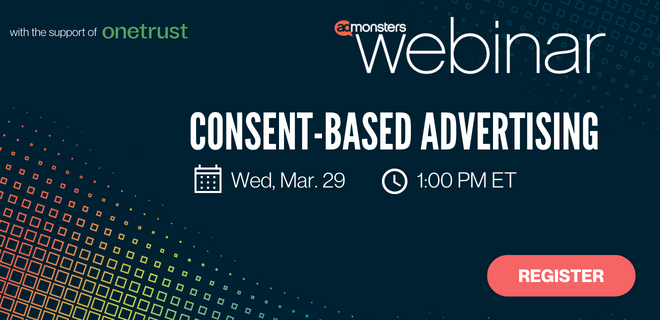
Online privacy regulations continue to expand, making many of the previous ways of collecting data a thing of the past. The new norm relies on first-party data collected directly from users based on their online behavior, purchases, preferences, and more.
First-party data is helpful for advertisers because the more you know about an online user, the more accurately you can pinpoint their interests and tailor advertisements to each user’s preferences. Today more than ever, however, consumers want to share data on their terms – that is where consent-based advertising comes into play.
Ahead of our upcoming webinar led by Strategic Solutions Engineer for OneTrust, Arshdeep Sood, “Consent-based Advertising: How You Can Automatically Build Audience Trust,” on March 29, 2023, at 1:00 PM EST, we chatted with Sood about ever-changing privacy regulations, consent-based advertising, and what publishers need to know to stay ahead of the game.
Kacey Perinelli: How does first-party data work to create a more personalized user experience online? 
Arshdeep Sood: First-party data is data (including user behavior, preferences, demographics, and purchase history) that a company collects directly from its customers or users, usually through interactions on its website, mobile app, or other digital platforms. Companies can create a more personalized user experience online by analyzing and utilizing this data.
For example, suppose a user frequently searches for a particular type of product on a company’s website. In that case, the company can use that data to recommend similar products the user might be interested in. Similarly, if a user previously purchased a product from the company, the company can use that information to personalize future marketing messages or promotions to that user. It helps increase the likelihood of the user making a repeat purchase.
First-party data can be a powerful tool for companies to create a more personalized and relevant user experience online. Still, companies must also be transparent about their data collection practices and ensure that they follow appropriate data privacy regulations to maintain user trust.
Forging Strong Relationships using Consent-based Advertising
KP: What is the definition of “consent-based advertising,” and what should publishers know about this type of marketing?
AS: Consent-based marketing requires explicit consent from users before their data can be collected and used for marketing purposes. This approach puts the consumer in control of their data and requires organizations to be transparent about their data collection and use practices.
In consent-based marketing, publishers and advertisers provide consumers with clear information about how their data is collected, used, and shared. Purpose-based consent is crucial in building trust with users, which explains the “why” behind data collection. Will it be used for analytics? To improve website performance? In targeted advertising? Personalized campaigns? Users must then actively opt in or consent before their data can be collected and used in marketing campaigns.
Publishers, who rely heavily on user data for advertising revenue, should be aware of consent-based marketing and take steps to implement it in their operations. This may include using cookie banners and consent and preference management, with forms that clearly explain data collection and use practices, giving users control over their data preferences.
In addition to being a legal requirement under regulations like GDPR (General Data Protection Regulation) and CCPA (California Consumer Privacy Act of 2018), consent-based marketing also increases user trust and loyalty, as users are more likely to engage with companies that are transparent and respectful of their privacy while delivering valuable, personalized experiences. Through this type of marketing, publishers can build stronger relationships with their users and improve the effectiveness of their marketing efforts.
Building Trust with Consumers Drives Sales
KP: What steps can publishers take to help build trust with their audiences?
AS: Building trust with audiences is crucial for publishers who rely on user data for advertising revenue, particularly in a privacy-centric world where users are increasingly concerned about data privacy and security. Some steps publishers can take include:
- Be transparent: Publishers should be open and transparent about their data collection and use practices. They should clearly explain to users how data is collected and used. It includes being clear about the types of data collected, the third-party partners involved, and how long they store the data.
- Provide options: Publishers should allow users to choose whether or not their data is collected and used and enable users to modify their preferences at any time. This means implementing a consent and preference management solution to offer an opt-in or opt-out mechanism (depending on legal requirements) and a clear and easy way for users to manage their data preferences.
- Orchestrate consent downstream: When users consent to their data usage for specific purposes and opt out of others, publishers need to communicate this data downstream to all systems in the marketing tech stack, to email databases, sales databases, analytics tools, and others to ensure that their preferences are being honored not only for specific systems but across your organization.
- Respect user rights: As an example, OneTrust’s Consent & Preference Management provides publishers with the solution they need to respect user rights, such as the right to access, correct, and delete personal data. It allows users to view and edit their data and provides a straightforward process for requesting the deletion of their data.
- Stay up-to-date with regulations: Our solution ensures publishers remain current with data privacy regulations and comply with relevant laws, such as GDPR and CCPA. This eliminates publishers’ burden of regularly reviewing and updating privacy policies and data processing practices – our platform automatically ensures compliance and updates.
By implementing these steps, publishers can help build trust with their audiences and establish themselves as responsible stewards of user data in a privacy-centric world.
KP: How can building trust with consumers and empowering them to choose what information to share online help publishers increase advertising revenue?
AS: Empowering users to make their own decisions about what data to share online leads to many significant advantages, such as:
- Increased user engagement: When users trust a publisher to respect their privacy, they are likelier to engage with their content and offerings. It can lead to increased form submissions, page views, longer time spent on the site, and higher click-through rates on ads, all of which can help boost revenue.
- Improved targeting: The collected data will likely be more accurate and relevant when users are empowered to choose what information to share. This can help improve ad targeting, making ads more relevant to users and increasing the likelihood of a click or conversion.
- Compliance with regulations: Data privacy regulations require organizations to obtain user consent before collecting and using personal data for advertising. By prioritizing user privacy, publishers can ensure that they comply with these regulations, which can help prevent costly fines and legal issues.
First-Party Data & Consumer Consent Lead to Overall Improvements
KP: What other advantages exist with having a first-party and consent-based data strategy?
AS: There are several other benefits to having a first-party and consent-based data strategy beyond building trust with consumers and increasing advertising revenue, including:
- Improved data quality: Consent-based data is typically more accurate and reliable, as it is provided directly by consumers who actively engage with a publisher’s content. This can improve the quality of data-driven decisions and increase the effectiveness of marketing efforts.
- Increased customer loyalty: When consumers feel that publishers respect their privacy and they have control over their data in exchange for valuable personalized experiences from a brand, they are more likely to develop a sense of loyalty and trust toward a publisher. It can lead to increased customer lifetime value and repeat business.
- Greater agility and adaptability: First-party data is owned and controlled by a publisher, giving them greater flexibility and adaptability when responding to changing market conditions and consumer preferences. This can help publishers stay ahead of the curve, design innovative marketing campaigns, and remain competitive in a fast-changing digital landscape.
- Improved brand reputation: Prioritizing consumer privacy and implementing a consent-based data strategy can help improve a publisher’s brand reputation, particularly in an environment where consumer privacy is increasingly top-of-mind. This can lead to positive word-of-mouth, increased brand recognition, and improved customer acquisition.
Ultimately, creating an online environment where users feel empowered can give publishers access to high-quality data and help them build strong, trust-based relationships with consumers, increasing advertising revenue and consumer loyalty over time.
Register for our free webinar, Consent-based Advertising: How You Can Automatically Build Audience Trust, on March 29, 2023, at 1:00 PM EST.
